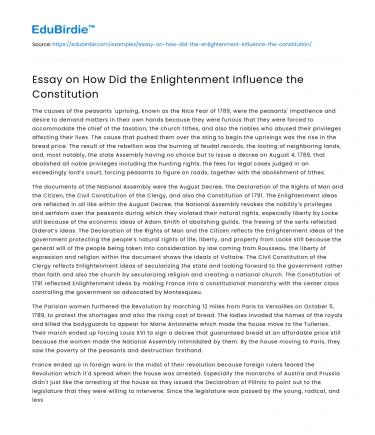Introduction
The Enlightenment, a pivotal intellectual movement of the 17th and 18th centuries, profoundly influenced the political, social, and economic landscapes of the modern world. Its emphasis on reason, individualism, and a scientific approach to understanding human society laid the foundations for transformative political philosophies. The United States Constitution, a cornerstone of democratic governance, was significantly shaped by Enlightenment ideas. Philosophers such as John Locke, Montesquieu, and Rousseau provided the ideological underpinnings that inspired the framers to construct a government rooted in the principles of liberty, equality, and justice. This essay explores the extent to which the Enlightenment influenced the Constitution, considering the incorporation of Enlightenment ideals into its framework and evaluating the responses to these influences through counter-arguments and real-life applications.
The Philosophical Underpinnings of the Constitution
The Enlightenment's influence on the Constitution is evident in its foundational principles, particularly the emphasis on natural rights and the social contract theory. John Locke’s theory of natural rights, which asserts that individuals inherently possess rights to life, liberty, and property, is reflected in the Constitution's Preamble and the Bill of Rights. Locke's assertion that governments must protect these rights or be subject to dissolution underpins the Constitution's provision for a government that derives its power from the consent of the governed. This revolutionary idea challenged the traditional monarchical systems and emphasized the importance of a government accountable to its citizens. As James Madison, one of the key framers, noted, "The accumulation of all powers, legislative, executive, and judiciary, in the same hands... may justly be pronounced the very definition of tyranny" (Federalist No. 47).
Save your time!
We can take care of your essay
- Proper editing and formatting
- Free revision, title page, and bibliography
- Flexible prices and money-back guarantee
Furthermore, Montesquieu’s concept of the separation of powers profoundly influenced the Constitution's structure. His advocacy for dividing government powers into distinct branches to prevent tyranny is manifested in the Constitution’s establishment of the legislative, executive, and judicial branches. This tripartite system ensures a balance of power, preventing any single branch from dominating the others. The system of checks and balances, enshrined in the Constitution, reflects Montesquieu’s vision and has been pivotal in maintaining democratic governance. While these principles were not without criticism, they provided a robust framework that has endured for over two centuries.
Counter-Arguments and Practical Implications
Despite the apparent alignment between Enlightenment ideas and the Constitution, some argue that the framers selectively applied these philosophies, resulting in inherent contradictions. For instance, while the Constitution espouses liberty and equality, the institution of slavery persisted, highlighting a significant moral and ethical dilemma. Critics argue that the framers compromised Enlightenment ideals by prioritizing political pragmatism over universal human rights. This contradiction has been a focal point of historical debate, raising questions about the limits of Enlightenment influence in the face of societal and economic pressures.
Moreover, the application of Enlightenment principles in real-life governance has often been fraught with challenges. The complexity of balancing individual rights with collective security, as exemplified in debates over privacy versus surveillance, underscores the ongoing tension between Enlightenment ideals and practical governance. Nonetheless, the Constitution's adaptability and its foundation in Enlightenment thought have enabled it to navigate these challenges. The landmark Supreme Court case of Brown v. Board of Education, which dismantled racial segregation, exemplifies the Constitution's capacity to evolve and more fully realize Enlightenment principles over time.
Conclusion
In conclusion, the Enlightenment considerably shaped the United States Constitution, embedding principles of natural rights, separation of powers, and a government accountable to its people. These ideas, drawn from the works of key Enlightenment thinkers, continue to influence democratic governance. While the implementation of these principles has faced challenges and contradictions, the enduring legacy of the Enlightenment is evident in the Constitution's resilience and adaptability. By examining the Constitution through the lens of Enlightenment philosophy, one gains a deeper understanding of its foundational values and the ongoing quest to achieve a more just and equitable society. As modern challenges test the limits of these ideals, the Enlightenment's impact remains a guiding force in the pursuit of democratic principles.






 Stuck on your essay?
Stuck on your essay?

